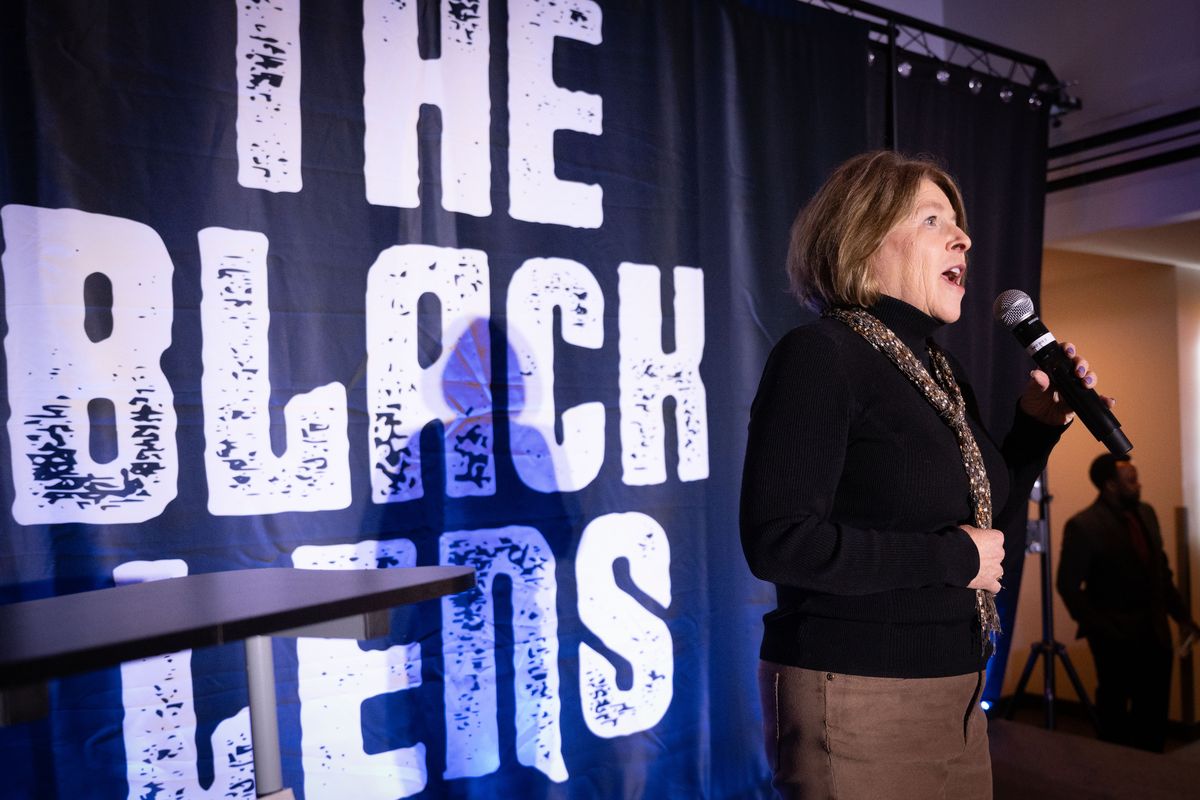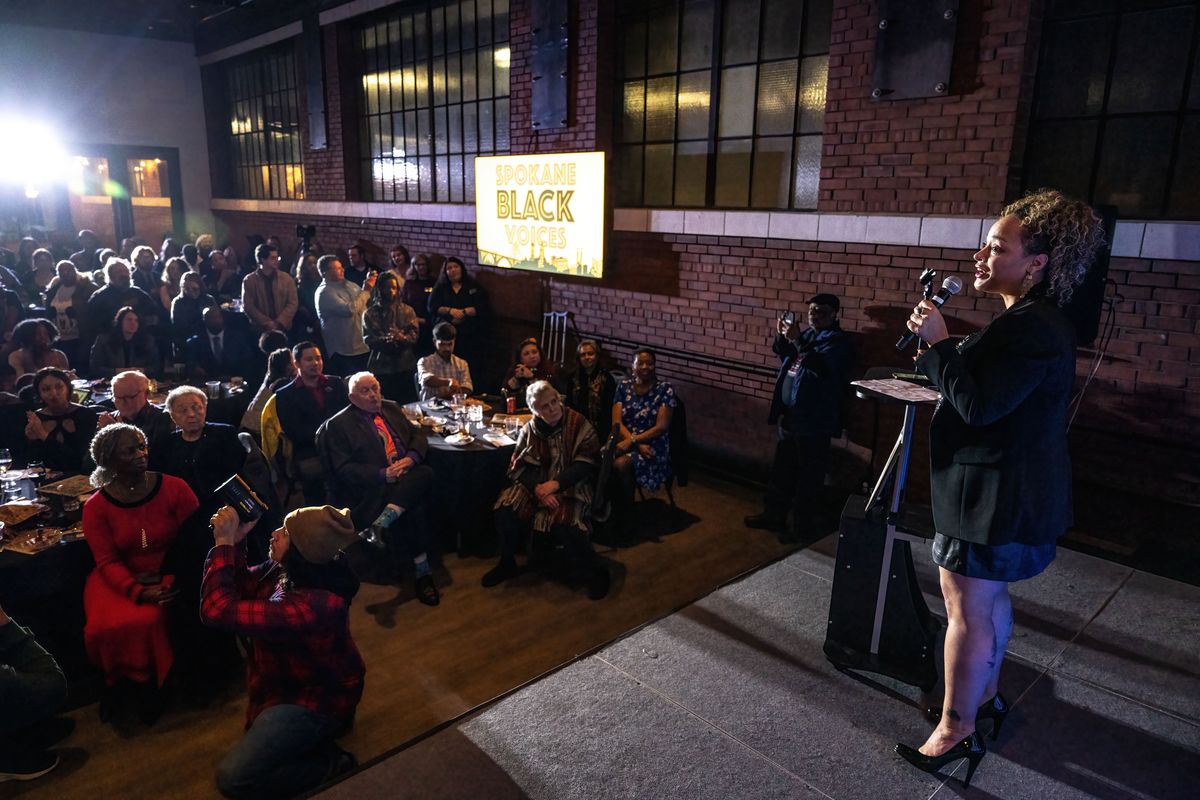Spokane’s Black newspaper has returned after a two-year hiatus.
“This is a voice for the Black community here in Spokane to tell stories, to share news and events from their perspective,” Natasha Hill, the newspaper’s editor, said at a relaunch celebration Friday evening at the Steam Plant rooftop event center.
The independent nonprofit publication will have a wider reach than before.
The monthly edition will be distributed to The Spokesman-Review’s nearly 60,000 print and digital subscribers the first Sunday of each month, as well as more than 3,000 additional print copies through free magazine racks around town at community centers and Black-owned businesses, and for free online at blacklensnews.com.
The Black Lens previously had a total distribution of 1,500 copies, with about 700 subscribers, and a website that was made up of PDFs of the print editions’ pages. The new Black Lens site will be updated as news happens, and includes an event calendar and a directory of Black-owned businesses across the region. It also has a larger presence throughout social media, with forthcoming email editions.
The relaunch coincides with Black History Month.
“We are so excited to be back!” said Renika Williams, a board member and daughter of Sandy Williams, the civil rights activist who founded The Black Lens in 2015.
Sandy Williams paused publication of The Black Lens in early 2022 to focus on opening the Carl Maxey Center, a Black community resource organization she founded in the East Central Neighborhood. She intended to resume publication in 2023, but she died in a plane crash in September 2022.
U.S. Sen. Maria Cantwell, who attended the event Friday, said she was heartbroken when she heard about the accident.
“She really was a force of nature in this community,” Cantwell said of Williams. “She was The Black Lens. She made it happen.”
Betsy Wilkerson, who was recently sworn in as Spokane’s first Black City Council president, said the loss of Sandy Williams and The Black Lens left a void of communication – both for Black residents and the city as a whole.
“The Black Lens is another testament that in Spokane, we all belong,” Wilkerson said.
Other speakers at Friday’s event included Spokane mayor Lisa Brown and NAACP president Lisa Gardner.

Sandy Williams’ family and a group of donors established the Sandy Williams Black Lens fund, hosted by the Innovia Foundation, to help bring the newspaper back. No-Li Brewhouse recently pledged $10,000 to the fund and challenged other businesses to match it, with several other businesses, foundations and individuals contributing over the past few weeks.
Hill, a Spokane lawyer and activist, was selected as interim editor to help launch the publication and to lead the search for a full-time reporter, and eventually a full-time editor.
The Black Lens is published in partnership with comma, a nonprofit community journalism lab.
The newspaper will be based at Gonzaga University with some production assistance from current and former members of The Spokesman-Review staff who have volunteered their time, but will be independent from Gonzaga and The Spokesman-Review.
The Black Lens has complete editorial control of its journalism, Hill said.
Since it is community-funded, articles can be republished by other organizations for free under a Creative Commons license.
“Every community should be able to replicate what we are doing now with The Black Lens,” Hill said.
Back in print, the new Black Lens also has a new look. The title logo has been redesigned with bold, starkly contrasting black and red font that was created specifically for the publication. The print version is a larger broadsheet size, rather than the smaller tabloid-sized format it was before.
The Feb. 4 edition contains profiles of local Black leaders and businesses, a column by Hill, a visual history of African American newspapers, and a splashy two-page spread of student artwork and essays that were featured at the Spokane Black Voices Symposium on the theme “Black Joy – An Aspirational Mindset.” The third annual symposium was presented by Northwest Passages at Gonzaga on Thursday.
At Friday’s relaunch event, Cantwell spoke about the importance of local journalism having a diversity of voices and news sources. With newspapers across the country closing or consolidating, she said Spokane is an outlier.
“Innovative community-based models – like this one – that help local journalism survive is something that people all across the United States should be paying attention to,” Cantwell said.
Cantwell called for more legislation to bolster local news. In 2021, she introduced the Local Journalism Sustainability Act, which would help financially support local news organizations through tax credits to incentivize hiring more journalists, and for subscribers and advertisers from local small businesses. She said she plans to introduce similar legislation this session.
“The situation is truly dire, so what is being pulled off today is monumental,” Cantwell said Friday. “It is the kind of counter-event that we want to see, that we are growing journalism, we are growing the diversity of voices and we are holding those in office and power accountable to answer the questions the community most cares about.”
Renika Williams remembers her mother’s dedication to The Black Lens.
“She would just be downstairs in her office for, like, 24 hours a day, working on the paper, just trying to get it out, because she just wanted to give a voice to some people, to see that community growing,” she said in an interview.
For her mother, Renika Williams said, “It’s never been about reaching a certain level of status; it’s never been about money. It’s never been about anything except serving the community.”
Renika Williams was close with her mother, so for her, the relaunch of The Black Lens is “even more personal.”
“When I lost my mom, it was the most difficult thing. Me and my mom were like super best friends, so it was really, really hard,” she said. “I’m still dealing with that now.”
But Renika Williams said seeing the community come together to relaunch The Black Lens has given her hope.
“When I see things like this, it gives me hope that there are other people out there who just want to do the work, and they just want to help out,” she said. “I think that this paper and the fact that we’re having so much backing, so much support from the community, is showing that people want to hear different voices.”
April Eberhardt, a contributing writer for The Black Lens, agreed.
“It fed my soul,” Eberhardt said of the community involvement. “It’s empowering to see the community’s interest in this, and I think that’s a testament to who Miss Sandy was, because it wouldn’t be that way if she hadn’t done it first.”
Eberhardt, a military spouse, calls herself a Spokane transplant.
“Every time you start a new place, you got to figure out how to get your bearing. Being here, The Black Lens was one of the things that helped,” Eberhardt said. “(Sandy Williams) was one of the first people in Spokane to make me feel like I had a place here.”
Now that the paper has relaunched, Renika Williams said her vision for The Black Lens is for it to continue to build community.
“The main thing that we want to focus on is trying to grow the physical community and break down the barriers between different people … and know that we all share similar stories,” she said. “I think once we start accepting and understanding our own stories, other people’s stories who are not like us, that’s when the community can grow and heal and work together, and it becomes beneficial for everyone.”
This story was originally published in The Spokesman-Review.
